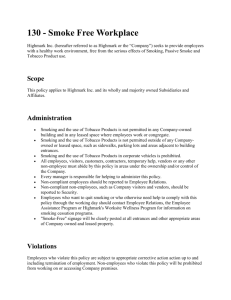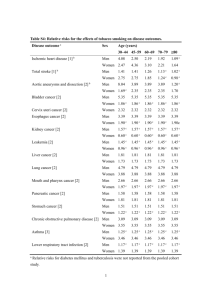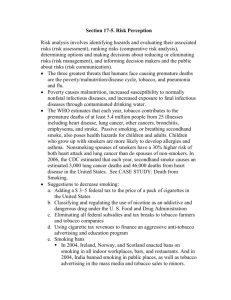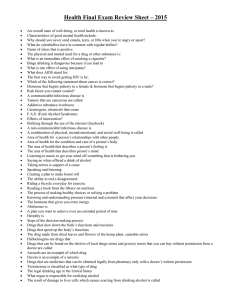02.330 Tobacco Policy
advertisement
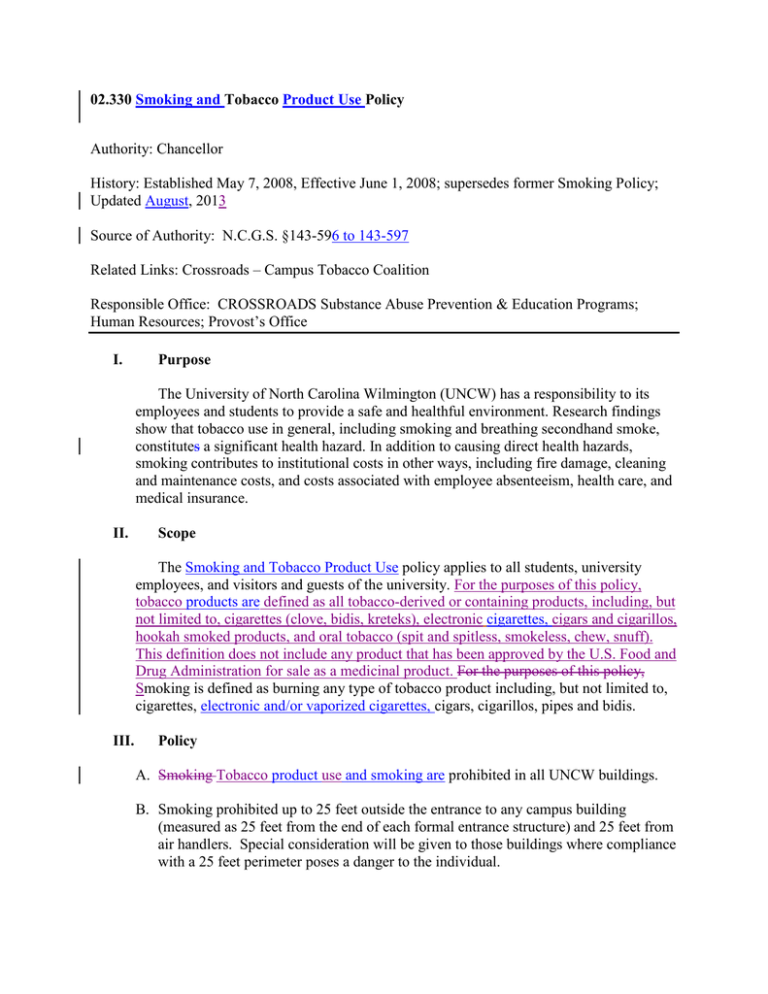
02.330 Smoking and Tobacco Product Use Policy Authority: Chancellor History: Established May 7, 2008, Effective June 1, 2008; supersedes former Smoking Policy; Updated August, 2013 Source of Authority: N.C.G.S. §143-596 to 143-597 Related Links: Crossroads – Campus Tobacco Coalition Responsible Office: CROSSROADS Substance Abuse Prevention & Education Programs; Human Resources; Provost’s Office I. Purpose The University of North Carolina Wilmington (UNCW) has a responsibility to its employees and students to provide a safe and healthful environment. Research findings show that tobacco use in general, including smoking and breathing secondhand smoke, constitutes a significant health hazard. In addition to causing direct health hazards, smoking contributes to institutional costs in other ways, including fire damage, cleaning and maintenance costs, and costs associated with employee absenteeism, health care, and medical insurance. II. Scope The Smoking and Tobacco Product Use policy applies to all students, university employees, and visitors and guests of the university. For the purposes of this policy, tobacco products are defined as all tobacco-derived or containing products, including, but not limited to, cigarettes (clove, bidis, kreteks), electronic cigarettes, cigars and cigarillos, hookah smoked products, and oral tobacco (spit and spitless, smokeless, chew, snuff). This definition does not include any product that has been approved by the U.S. Food and Drug Administration for sale as a medicinal product. For the purposes of this policy, Smoking is defined as burning any type of tobacco product including, but not limited to, cigarettes, electronic and/or vaporized cigarettes, cigars, cigarillos, pipes and bidis. III. Policy A. Smoking Tobacco product use and smoking are prohibited in all UNCW buildings. B. Smoking prohibited up to 25 feet outside the entrance to any campus building (measured as 25 feet from the end of each formal entrance structure) and 25 feet from air handlers. Special consideration will be given to those buildings where compliance with a 25 feet perimeter poses a danger to the individual. C. Smoking and tobacco product use are prohibited in all UNCW vehicles. D. The sale of tobacco products on campus is prohibited. E. The free distribution of tobacco products on campus is prohibited. F. Registered student organizations are prohibited from accepting event sponsorship from tobacco brand companies and from promoting tobacco products. IV. Implementation and Enforcement A. Enforcement of this policy will depend upon the cooperation of all faculty, staff, students, visitors, and guests not only to comply with this policy but also to encourage others to comply with the policy in order to provide a healthy environment in which to work, study, and live. B. Repeated or intentional non-compliance with these provisions will be managed in accordance with Student Affairs guidelines for all students and disciplinary guidelines for staff and faculty. When necessary, the university will institute discipline against the offending individual, which may result in a range of sanctions, including but not limited to the following: for students - warning, disciplinary probation, or suspension; and for employees - warning, suspension without pay, or dismissal. C. All non-smoking areas shall be clearly marked with appropriate signage and other physical indicators, especially related to the 25 foot perimeter policy. Any smoking waste management products should be placed outside of the 25 foot perimeter. D. Housing and Residential Life is responsible for enforcing and implementing sanctions in campus and student residences, per item #33 in the Code of Student Life, Residence Life publication, “A Guide to On-Campus Living,” E. Visitors or guests using tobacco products or smoking in areas covered by this policy will be asked to refrain from such use within 25 feet from the buildings or leave the premises. University law enforcement officers may be contacted to escort the person off the premises or cite the person for trespassing if the person refuses to leave the property. V. Smoking Cessation Services A. Smoking and tobacco product cessation services for students will be provided by UNCW’s Substance Abuse Prevention and Education Program, in partnership with Health Promotion Services and the Abrons Student Health Center. B. Information regarding smoking and tobacco product cessation services and education for employees is available through Human Resources and/or the State Health Plan. JUSTIFICATION During 2012-13 Mike Walker (Associate Vice Chancellor for Student Affairs / Dean of Students) convened a Review Committee to provide input on tobacco use policy. • John Scherer, Associate General Counsel • Dr. Rebecca Caldwell, Director of Crossroads and CARE (one of the principal authors of the current UNCW Tobacco Policy) • Katrin Wesner, Director of the Abrons Student Health Center • Stan Harts, Director of Environmental Health and Safety • Jennie McNeilly, Associate Dean of Students • Holly Taylor, Assistant Dean of Students • Dr. Kemille Moore, representing the Faculty Senate Student Matters Committee The following were contributing factors toward recommending to change the UNCW Tobacco Policy to include prohibiting E-Cigs: • • • • • • • • In early July the New Hanover County Board of Health approved a new resolution regulating for E-Cigs which encouraged further study of the actual effects on human health. The Board cited concerns that such products are not safe alternatives to smoking and proclaimed that E-Cigs are “not guaranteed safe.” The Board also cited that since these products contain Nicotine they can be addictive to users. In June 2013, the North Carolina General Assembly and the Governor approved a law barring the legal purchase of vaporized cigarettes by minors effective August 1, 2013. There is limited conclusive research on whether or not second-hand vapor from E-Cigs is safe. E-Cigs just came on the market several years ago, and initial research both supports and refutes that there are second-hand chemical risks in this tobacco-free product (the FDA claims that E-Cigs pose acute health risks and contain detectable levels of carcinogens and toxic chemicals to individual users, and that the vapor emitted into a room “may not be safe”). NIH claims that E-Cigs are 20% as dangerous as regular tobacco cigarettes in terms of health risks to users. Marketing of E-Cig products include use for smoking cessation but critics argue they may also introduce younger non-smokers into using, which may then lead to use of regular tobacco cigarettes. Though the product is marketed as an assistive device for smoking cessation, it is hard to determine whether that is the common intended use (versus users using the product inside where tobacco cigs are otherwise prohibited). Students, faculty and staff have been seen using this product in various university facilities. Faculty indicate that use of these products is disruptive in the classroom.
